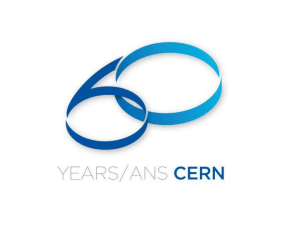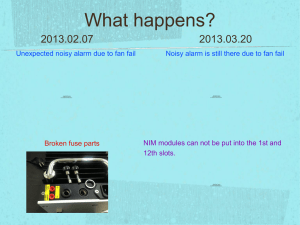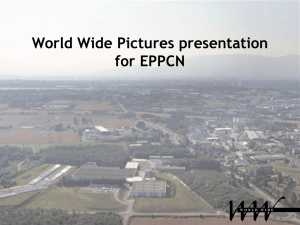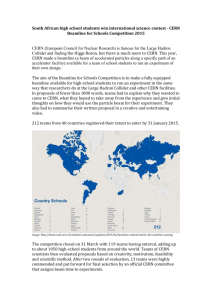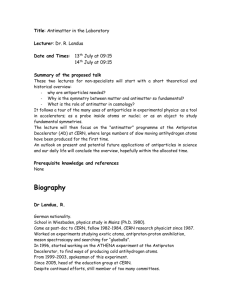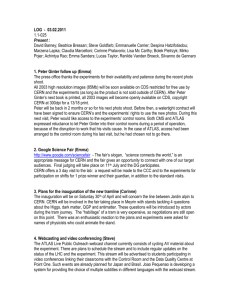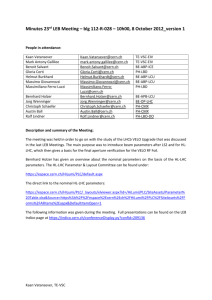tau
advertisement
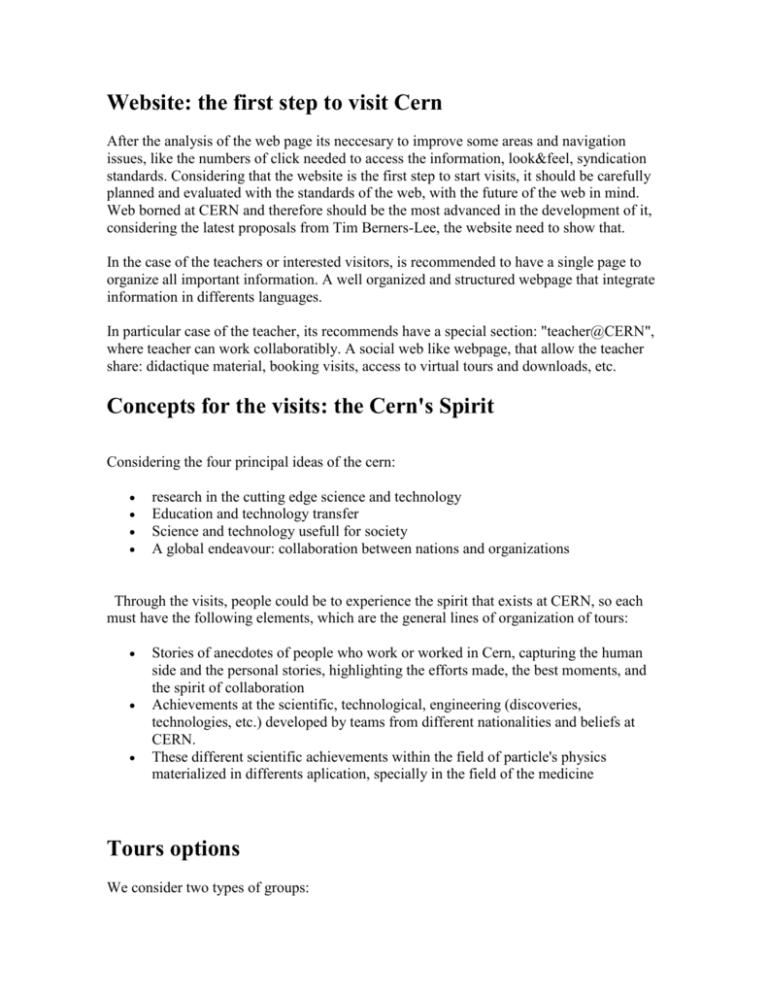
Website: the first step to visit Cern After the analysis of the web page its neccesary to improve some areas and navigation issues, like the numbers of click needed to access the information, look&feel, syndication standards. Considering that the website is the first step to start visits, it should be carefully planned and evaluated with the standards of the web, with the future of the web in mind. Web borned at CERN and therefore should be the most advanced in the development of it, considering the latest proposals from Tim Berners-Lee, the website need to show that. In the case of the teachers or interested visitors, is recommended to have a single page to organize all important information. A well organized and structured webpage that integrate information in differents languages. In particular case of the teacher, its recommends have a special section: "teacher@CERN", where teacher can work collaboratibly. A social web like webpage, that allow the teacher share: didactique material, booking visits, access to virtual tours and downloads, etc. Concepts for the visits: the Cern's Spirit Considering the four principal ideas of the cern: research in the cutting edge science and technology Education and technology transfer Science and technology usefull for society A global endeavour: collaboration between nations and organizations Through the visits, people could be to experience the spirit that exists at CERN, so each must have the following elements, which are the general lines of organization of tours: Stories of anecdotes of people who work or worked in Cern, capturing the human side and the personal stories, highlighting the efforts made, the best moments, and the spirit of collaboration Achievements at the scientific, technological, engineering (discoveries, technologies, etc.) developed by teams from different nationalities and beliefs at CERN. These different scientific achievements within the field of particle's physics materialized in differents aplication, specially in the field of the medicine Tours options We consider two types of groups: Ocassionally groups: mostly the general public and tourists. A short informative visit in the Globe and Cern Shop; Booked in advance: schoolgroups, teachers group and inteterested groups. A well structured visit - varied combination, depending on age and specified interest; an option to customize the visit in the website should be available to this group, split in two links: one for general informed visitors and one for teachers, that need to be part of the teachers@cern community. Train/transportation The train is the way to visit several facilities and key points in the cern. It offers an opportunity to people to get a general impressions of the work at cern: anecdotes (a short tale narrating an interesting or amusing biographical incident in the cern by the guide) important facilities (clearly designated route) Guide use road names to add value to the tour The train improves visitor's mobility from between facilities depending on the itinirary of the tour, decided previously for the teacher or guest. The train can be used to accomodate the splitting of groups to manage site visits (an easy alternative for rotating large group). Design of the train: two or three wagons, magnet dipole shaped, in blue or red (and white). Considering all possibles people's dissabilities. In some cases the persons can walk betwen differents points, depending of the distances, according to our experience, distance will be less than 5' walking. Another option is to take a bus and put a big sign on it, with CERN logo and some apropriate graphics. Valuables points/facilities to visit and usefull for teaching. Considering the huge quantity of buildins at CERN, just some of them could be used for the tour, the next list (not comprehensive) inludes the most important points that we consider usefull for teaching: Center for Visitor for each proyect/experiments. ps-linac-lear lhcb atlas cms sm18 ad teacher lab with students Buildings: Tower CLIC Theoretical physics Computer center Isolda Roads: Booster Democrito Einstein Bohr Pauli Heinsenberg Teachers@Cern We recommend a Internet based community for teachers, in different languages, with the same feature of a social web: forums, chatrooms, profile, cv, etc. with material prepared for CERN and by teachers. A webspace of collaboration for teachers of member states and the rest of the world. Integrating information from Cern projects, world's physics news and other cutting age technologies. The ideas to be include in the design of this web, need to be close of the Tim Berners-Lee's proposal for the semantic web:"I have a dream for the Web [in which computers] become capable of analyzing all the data on the Web – the content, links, and transactions between people and computers. A ‘Semantic Web’, which should make this possible, has yet to emerge, but when it does, the day-to-day mechanisms of trade, bureaucracy and our daily lives will be handled by machines talking to machines. The ‘intelligent agents’ people have touted for ages will finally materialize." The purpose of all websites is about how to represent information, and make it understandable by computers, so that they can perform more of the tedious work involved in finding, sharing, and combining information on the web, not about the information itself. With this tool the teachers can be part of the community that easily integrate all the different information. It is recommended to connect the differents sources, adopting a standard system like RSS, ATOM, others, in each of the webpages of the cern public project. The goal is to integrate all the relevant resources for teaching: 1. 2. 3. 4. 5. 6. curriculum connection videos, images, documents (media) social linking (people, institution, etc.) web services (blogs, mail, facebook, flickr, google docs, etc.) cerns'experiments other sources Didactiques resources A free and accesible repositorie of differents didactical materials, instructional models, images, videos, games, softwares, curricula, etc, powered by a robust search engine. In this area, the teacher can organize and prepare courses: selecting materials, organizing, creating, reusing, translating documents, etc. But also can collaborate in the design and develop of the knowledge for instructional's model for physics in general, improving their own and others curriculums, solving common problems and issues. All materials developed need to be accessible for use by teachers. What this means is all material are "open" for translation, change, deliver, etc (like Creative commons license). All teachers need to be registered to participate in this comunnity. Interactive tour planner This is one of the most usefull tool recommned to include in the website and allow to the teacher organize and customize a Tour in Cern. In the virtual tour planner, the teachers can learn about of several experiments comissioned at Cern, linking concepts to their own curriculum. In this way the teacher can add to the "visit list cart" the point/facility to visit. After click in the "checkout" all the information is sent to "visitor's office", and they prepare the itinirary for the visits, including special and unknown interest's points in the way of the tour. And send back the information to the teacher. It suppose a websystem to manage all the visits, invite guides (previously profiled) to match better with the kind of the visit. The PIC is the contact in cern for teacher, who can send information through internet o by real mail, all the needed material to prepare the class:full color brochures, questionnaires, all in the mother tongue of the student, etc.
